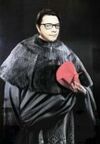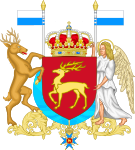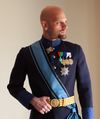Monarch
|
Feudalism • Plutocracy • Timocracy • Doctrinism (Base • United • Division • Evolutionary) |
A monarch is a person or people who heads a monarchy, a form of government in which a nation's sovereignty is vested in an individual, sometimes with political powers exercised by that person. Monarchs may be autocrats, as in absolute monarchy, or ceremonial heads of state with little to no power, or may possess a level of power anywhere in between. A legally bound monarch is known as a constitutional monarch.
Most states only have a single monarch at any given time, although a regent may rule when the monarch is a minor, not present or debilitated. Two monarchs have ruled simultaneously in some countries, as in the ancient Greek city-state of Sparta or the joint sovereignty of spouses or relatives (e.g. William and Mary of Kingdom of England and Scotland, Peter and Ivan of Russia & Charles and Joanna of Castile.).
Titles
Monarchs have various titles - king or Queen (e.g. King of Spain, Queen of England), Prince or Princess (e.g. Sovereign Prince of Monaco), Emperor or Empress (e.g. Emperor of Japan, Empress of India), Tsar or Tsarina (e.g. Tsar of Bulgaria, Tsarina of Russia) or even Duke or Grand Duke/Duchess (e.g. Grand Duke of Luxembourg). Many monarchs are distinguished by titles and styles. They often take part in certain ceremonies, such as a coronations, state visits and other such functions.
Succession and government types
Monarchies are associated with political or hereditary rule. Most monarchs, both historically and in the present day, have been born and brought up within a royal family over a period of time. This is known as a dynasty, and this upbringing usually involves training for future duties. Different systems of succession have been used, such as proximity of blood, primogeniture and agnatic seniority (Salic law). Whilst traditionally most monarch have been male, female monarchs have ruled in antiquity. The term "queen regnant" refers to a ruling monarch, while a "queen consort" refers to the wife of a reigning king.
Some monarchies are non-hereditary. In an elective monarchy, the monarch is elected but otherwise serves as any other monarch. Historical examples of elective monarchy include the Holy Roman Emperors (chosen by prince-electors but often coming from the same dynasty) and the free election of kings of the Polish–Lithuanian Commonwealth. Modern examples include the Yang di-Pertuan Agong of Malaysia and the Pope of the Roman Catholic Church, who serves as Sovereign of the Vatican City State and is elected to a life term by the College of Cardinals.
Monarchies have existed throughout the world, although in recent centuries many states have abolished the monarchy and becomes republics. Advocacy of republics is called "Republicanism", while advocacy of monarchies is called "Monarchism". The principal advantage of a hereditary monarchy is the immediate continuity of leadership, with a usually short interregnum (as seen in the classic phrase "The King is dead. Long live the King!"). Form of governments may be hereditary without being considered monarchies, such as that of family dictatorships or political families, which are present in many democracies.
List of current micronational monarchs
Note: Please add new names in alphabetical order and only if a picture is available to attach.
















































